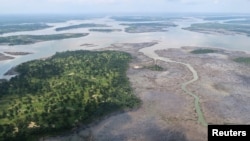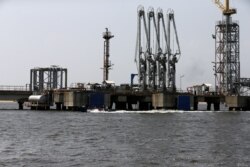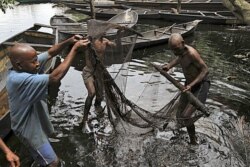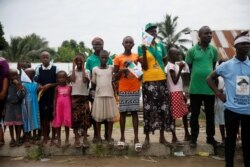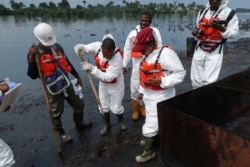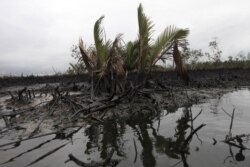The Niger Delta is where Nigeria, Africa’s largest oil producer, pumps out its most lucrative natural resource. But while companies like Shell, Chevron and ExxonMobil operate there and extract billions of dollars worth of crude oil, millions of people in the region are poor.
Their traditional livelihoods as farmers and fishermen have been badly affected by more than 6,000 reported oil spills that have damaged the environment over the past 50 years.
Legborsi Yamaabana, a 33-year-old activist, was born and raised in the historic kingdom of Ogoni, one of the better-known Niger Delta communities. As a child, he said his family lived off the harvest of the lush land and thriving freshwater creeks. His mother planted cassava, peppers and okra. They managed well.
But as he grew older, he noticed alarming changes in the environment, describing them as “gory.”
He decided to study petroleum engineering at a nearby university to get a better understanding of the contamination wreaking havoc in his community.
“You could find some lifeless fishes on the shores of the sea… the whole place [where my mother used to farm] is dark. It’s caked with hydrocarbon.”
In 2016, the Nigerian government kicked off a billion dollar environmental remediation project in Ogoni, using a 2011 United Nations Environment Program (UNEP) report as a blueprint for the undertaking.
The project gets most of its financing from international oil companies, including Shell, the largest operator, which released an initial $10 million to help set up the Hydrocarbon Pollution Remediation Project. The government agency, known as HYPREP, was mandated to handle the cleanup exercise.
UNEP now provides technical support, training HYPREP staff. Cleanup has begun in areas HYPREP calls “less complex sites.”
But Yamaabana says the project is plagued by corruption.
"Everything is being shrouded in secrecy... everything is being done in the Nigerian way,” he told VOA. “They are not doing anything called cleanup.”
Yamaabana is the president of the Ogoni Youth Federation, which claims to have 11,000 members. The federation has filed a lawsuit against HYPREP, demanding to know exactly how the $200 million per year that’s being earmarked for the project’s first five years will be used. This month, it even went as far as asking Shell not to release any more money.
Yamaabana is accusing HYPREP of “cutting corners” by dumping contaminated soil in wells instead of following the recommendations of the UNEP report.
The report advised the Nigerian government to address urgent public health needs. This includes providing alternative drinking water to areas in Ogoni that have contaminated water supply.
On this, Yamaabana says the government has failed.
He said, "Our people still drink from polluted sources of water. As I speak with you, our people still swim and bathe from that same water."
Speaking to local media, Ogoni-born environmental scientist Dr. Marvin Dekil and the head of HYPREP’s coordination office said not all communities are supposed to get alternative water supplies from the government.
“There has been a whole lot of misinformation about who should get water and who shouldn’t get water in this,” Dekil said.
UNEP reported that the levels of benzene, a known carcinogen, in the drinking water from wells in the area in Ogoni known as Nisisioken Ogale was 900 times above the World Health Organization guideline.
However, Fyneface Dumnamene, of the Youths and Environmental Advocacy Centre, believes the government of President Muhammadu Buhari is showing commendable commitment to getting the job done.
"They have succeeded in bringing contractors to site," he told VOA. "So far they have also made efforts in meeting with some of the stakeholders involved.
In 2016, Dumnamene spoke at the 71st session of the United Nations General Assembly as a representative of the Niger Delta youth.
While praising the government, Dumnamene thinks the environmental project’s procurement process was compromised. A local media investigation found that some of the contracted companies aren’t qualified to handle the work, specializing in areas such as fashion and poultry farming.
HYPREP rejects these criticisms. The agency’s head of communications and community engagement, Isa Wasa, told VOA that the contracted companies do meet the criteria for doing the work.
"All the contractors are qualified because there are certain documents that they had to present, which they did," he said.
This is not the first cleanup in the Niger Delta. There have been many over the years, but they’re often met with skepticism, civil rights advocate Inemo Samiama told VOA.
HYPREP is keenly aware of the need to make sure people feel they are benefitting from the agency's presence. Wasa told VOA that nearly 500 locals have been given jobs to work at the sites. HYPREP says more than 20,000 people have received free healthcare during a medical outreach mission that the agency organized.
But, Dumnamene says there’s still an information gap.
“They go to chiefs' houses. They meet opinion leaders. They don’t really interface with the people although they’ve made efforts one or two times to do so,” he said.
Now, HYPREP signposts are being destroyed. Earlier this year, local youth burned a HYPREP bus that was carrying government staff and journalists. HYPREP is facing 10 lawsuits filed by people from the region.
However, Celestine AkpoBari, a veteran environmental activist and national coordinator of the Ogoni Solidarity Forum, says people in the region have expected too much, too soon from the cleanup. He says HYPREP has done well so far and that those who are denouncing it do not have a scientific understanding of the technicalities involved in such a complex remediation.
He admits the Niger Delta people have become hardened, saying that the oil industry has devastated many lives.
"The people have been pushed to the wall. They’ve been told lies over a million times,” AkpoBari said. “[Oil has] been a very very big curse in capital letters. In fact, it is the reason for corruption.”
Environmentalists say it could take 30 years to sanitize and restore the region's environment.
Yamaabana warned that if the government fails to deliver, people may resort to violence, describing the brewing frustrations as an “imminent danger.”
But he and other activists say violence is the last thing they want to see happen in a region that has already seen its share of hardship.




